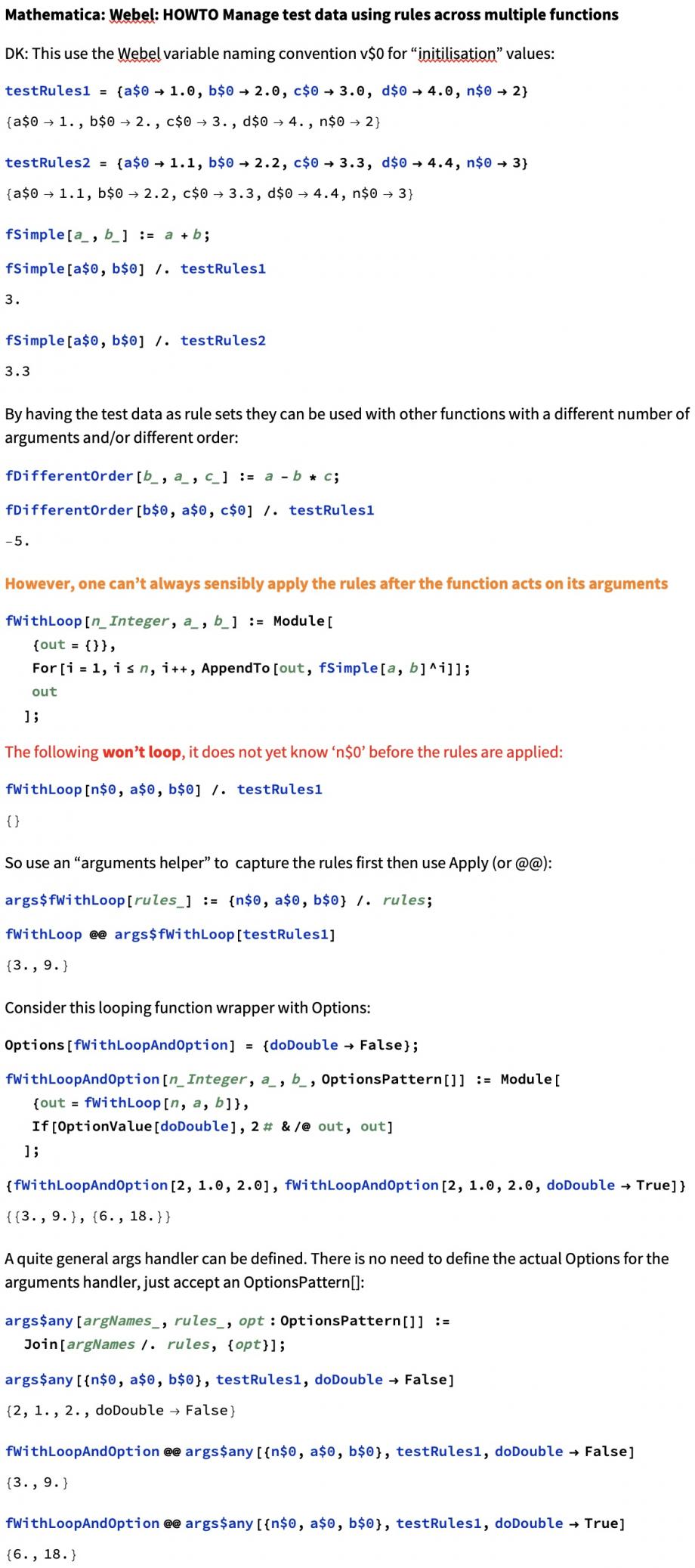Webel IT Australia promotes the amazing Mathematica tool and the powerful Wolfram Language and offers professional Mathematica services for computational computing and data analysis. Our Mathematica
tips, issue tracking, and wishlist is offered here most constructively to help improve the tool and language and support the Mathematica user community.
DISCLAIMER: Wolfram Research does not officially endorse analysis by Webel IT Australia.
It can be useful to manage test data across multiple functions with Rules:
testRules1 = {a$0 -> 1.0, b$0 -> 2.0, c$0 -> 3.0, d$0 -> 4.0, n$0 -> 2}
{a$0 -> 1., b$0 -> 2., c$0 -> 3., d$0 -> 4., n$0 -> 2}
testRules2 = {a$0 -> 1.1, b$0 -> 2.2, c$0 -> 3.3, d$0 -> 4.4, n$0 -> 3}
{a$0 -> 1.1, b$0 -> 2.2, c$0 -> 3.3, d$0 -> 4.4, n$0 -> 3}
Note how this employs the Webel convention of suffixing a variable name with '$0' to indicate that it is an "initialisation" target!
Note also how the functions the test data are applied to need not use every variable:
fSimple[a_, b_] := a + b;
fSimple[a$0, b$0] /. testRules1
3.
fSimple[a$0, b$0] /. testRules2
3.3
fDifferentOrder[b_, a_, c_] := a - b * c;
fDifferentOrder[b$0, a$0, c$0] /. testRules1
-5.
fWithLoop[n_Integer, a_, b_] := Module[
{out = {}},
For[i = 1, i <= n, i++, AppendTo[out, fSimple[a, b]^i]];
out
];
fWithLoop[n$0, a$0, b$0] /. testRules1
{}
Apply (or @@):
args$fWithLoop[rules_] := {n$0, a$0, b$0} /. rules;
fWithLoop @@ args$fWithLoop[testRules1]
{3., 9.}
Options:
Options[fWithLoopAndOption] = {doDouble -> False};
fWithLoopAndOption[n_Integer, a_, b_, OptionsPattern[]] := Module[
{out = fWithLoop[n, a, b]},
If[OptionValue[doDouble], 2 # & /@ out, out]
];
{fWithLoopAndOption[2, 1.0, 2.0],fWithLoopAndOption[2, 1.0, 2.0, doDouble -> True]}
{{3., 9.},{6., 18.}}
Options for the arguments handler, just accept an OptionsPattern[]:
args$any[argNames_,rules_, opt : OptionsPattern[]] :=
Join[argNames /. rules, {opt}];
args$any[{n$0, a$0, b$0}, testRules1, doDouble -> False]
{2, 1., 2., doDouble -> False}
fWithLoopAndOption @@
args$any[{n$0, a$0, b$0}, testRules1, doDouble -> False]
{3., 9.}
fWithLoopAndOption @@
args$any[{n$0, a$0, b$0}, testRules1, doDouble -> True]
{6., 18.}


